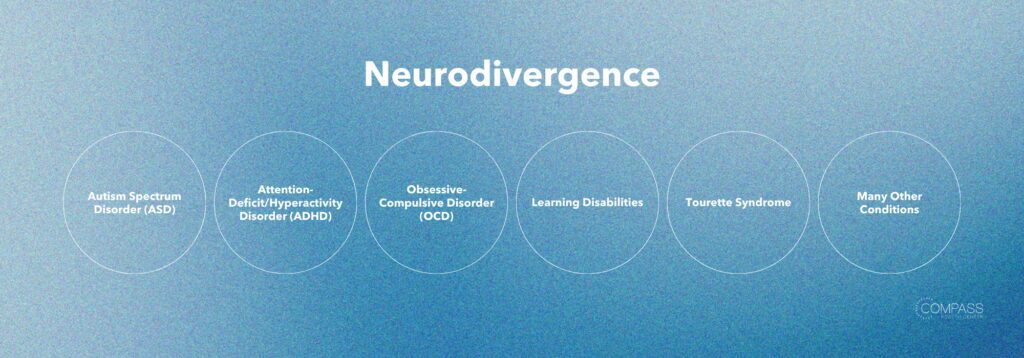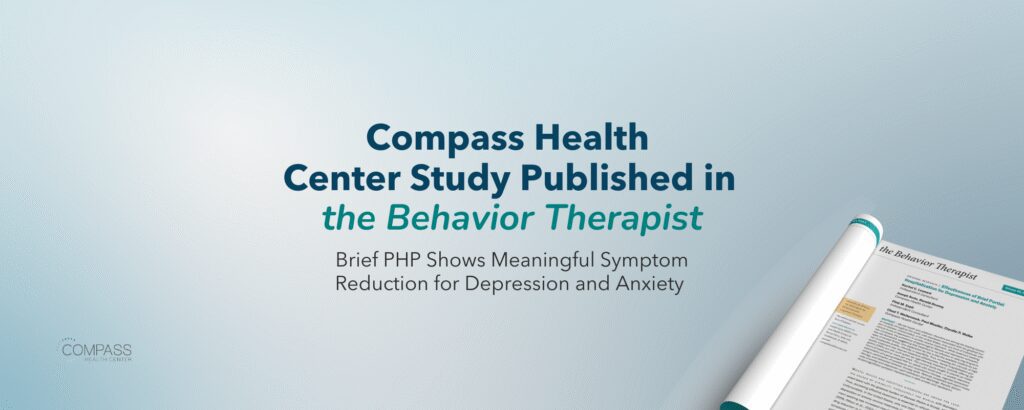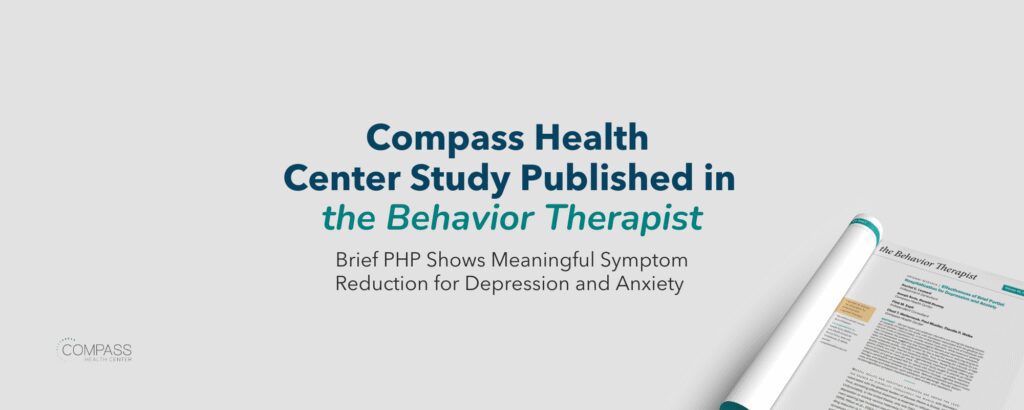
Am I Neurodivergent? Recognizing the Signs and What to Do Next
In recent decades, research and reporting on ADHD and Autism have increased in mainstream media, educational settings, and medical literature. These conversations have helped to spread awareness and decrease past and present stigmas. In a positive feedback cycle, the collective gains in understanding increase opportunities for public advocacy, further encouraging people to meet their needs equitably through a variety of sensory aids, social supports, and greater understanding and compassion from others. Societally, we’re growing more conscious of the benefits of increased accessibility to learning and support in institutions including schools, healthcare facilities, and public spaces. While once marginalized viewpoints are gaining long-deserved respect and support, gaps remain in our knowledge, and appropriate resources continue to expand.
As awareness spreads and stigma decreases about autism specifically, members of autistic communities are speaking out about their experiences and what it’s like to be an autistic individual living in a neuro-normative (i.e. people who don’t identify as neurodivergent) world. As our awareness within the larger community grows, it’s only natural for someone to wonder: “Does this apply to me?,” “Am I neurodivergent?,” and “Could this help explain some of the challenges I’ve experienced?”
In this blog, we’ll discuss the term “neurodiversity,” where it comes from, and its connotations. We’ll also address identities that fall under the umbrella term of neurodivergent and offer ideas for further exploration. If you find yourself relating to the information and are curious to learn about these traits in yourself and others, keep reading.
What Does Being Neurodivergent Mean?
The term “neurodiversity” was first used in the late 1990s by an Australian psychologist, Judy Singer, to describe the idea that each person has a unique set of abilities and needs. Singer used the term to promote inclusion and normalcy around the many different ways that a person can function in the world. “Neurodivergence” has since helped people build upon the idea that Autism Spectrum Disorder (ASD), Attention-Deficit/Hyperactivity Disorder (ADHD), Obsessive-Compulsive Disorder (OCD), Learning Disabilities, Tourette Syndrome, and many other conditions are variations of human brain functioning, as opposed to “disorders,” “deficits,” or “impairments.”
In contrast to dated models that proposed something is “wrong” when a person thinks differently, we can increasingly acknowledge that people see the world differently, process information differently, and therefore have different ways of interacting. Consider the parallels between neurotypes and computer operating systems – none are right or wrong, and discussing different operating systems is far more complex than a matter of better or worse.

A Shift from the Medical Model to the Social Model
While humans are not computers, it remains true that certain systems will work better for some people than others, there are different circumstances under which they work optimally, and they will have different vulnerabilities and obstacles.
“Neurodiversity” as a construct was also meant to pull us away from a medical model of disabilities. In historical medical models, any deviation from the “norm” was seen as a pathology, or a problematic deficiency. In a social model of disabilities, a person’s change or variation from the norm is an expectation rather than an aberration, and chronic, negative experiences relating to disability are attributed to society’s lack of accommodation or willingness to allow for change, not an individual person’s deficiency.
You can see where the term “neurodiversity” in and of itself could help spread the idea that different is not “bad,” different is just different, and we are all unique. In the loosest definition of this term, a person could argue that we are all neurodivergent in some way or another.
Why More People Are Talking About Neurodivergence
Presentations for a person under the neurodivergent umbrella have been increasing over the span of the last 20 years (CDC, Autism and Developmental Disabilities Monitoring). There have certainly been improvements in identifying symptoms and understanding the complexities of ASD, ADHD, OCD, and others listed above. We also live in an age of self-diagnosis culture; it’s easy to find videos listing ADHD and ASD symptoms. This increased awareness has broadened access to support and intervention while also helping to decrease shame, taboo, and misunderstandings.
At the same time, there’s a risk of over-simplification and misinformation being spread online. We all have areas of interest, food preferences, difficulty connecting with others at times, and executive functioning strengths and weaknesses. So, if some of these “symptoms” are universal, what does “neurodivergence” really mean, and at what point does it warrant intervention?
Similarly, while we said that in a loose definition, we’re all neurodivergent, claiming that identity can also be minimizing and invalidating to those individuals who have an identified, clinically significant diagnosis. So, as always, it’s important to be thoughtful and respectful when throwing around terms like, “I have ADHD right now,” or “that’s just my Autism” if, in fact, it’s not true for you. Like other things, talking like this can be a badge of honor and a reclaimed moment for people who have historically been othered, and if it’s not true for you, it can be invalidating.

Why Labels Matter—and When They Can Hurt
Neurodiverse is a broad term and can refer to many things. Often, it is used in media to describe neurodevelopmental disorders (i.e., Autism Spectrum Disorder, ADHD, Tourette Syndrome, etc.). Further, the term is frequently used with non-specific symptoms: attentional difficulties, organization and planning deficits, sensory needs/discomforts, emotional and behavioral dysregulation/outbursts, specific interests or obsessions, limited food preferences, difficulty interpreting social cues, and difficulty initiating or maintaining interpersonal relationships.
While symptoms of anxiety and depression can be present for neurodivergent individuals, anxiety and depression are not typically considered under the umbrella of neurodiversity. Anxiety can run hand-in-hand with difficulty functioning in a neuro-normative world. It’s a common myth that Autistic individuals don’t seek interpersonal relationships. More often than not, neurodivergent individuals desire relationships and connection with others, but find it difficult to sustain the perspective-taking and flexibility called for in close, interpersonal relationships (Stewart et al., 2024). Similarly, it’s common for us to compare our performance on things to others around us. In a world where “neurotypical” individuals are the majority and we’re judged/graded/evaluated based on these neuro-normative characteristics, anxiety surrounding one’s performance, ability, and shame of carrying a lifetime of not being deemed “successful” can lead to frequent negative self-talk and diminished self-concept.
Another way of thinking about it – anxiety and depression can be “treated.” We expect symptoms of anxiety and depression (and other mental health disorders) to decrease with the appropriate interventions (Smits et al., 2008). Traits of neurodiversity remain fixed throughout the lifespan. They may shift as individuals develop, and people utilize various adaptive strategies for their environments, but remain constant. As such, when neurodivergent individuals find themselves feeling anxious and depressed and seek treatment, it has been most helpful to find a therapist who is well-versed in neurodiversity. If you find yourself wondering if your treatment goals are attempting to change a trait of neurodiversity, speak up. It’ll never hurt to advocate for yourself.
Am I Neurodivergent? Key Signs to Look For
Neurodivergence is lifelong. There can be many clues pointing towards a person’s neurodivergence. As a starting point, explore with curiosity, “has this always been true for me?” this invites other questions, including, “what evidence do I have for that?” Check out this list of potential habits, routines, and preferences that could suggest neurodivergence:
- Change is hard for everyone, but you find yourself having bigger, upset reactions to small changes in routines and plans. Your routines keep you going day-to-day.
- You easily experience sensory overload: lights are too bright, sounds are too loud or the “wrong” sounds are loud and clear while voices you’re listening to aren’t, crowds are unsettling, etc.
- Social cues are hard to catch; you feel awkward in a group even though you can “perform” when needed. Social interactions can feel very draining.
- You have a hard time attending to something for a long time, and you have a very hard time getting back on task after you’ve been interrupted.
- You might have a hard time getting projects started, staying on task with them, or completing them. Or, all of those might be challenging.
- You may feel like you’re at the whim of your impulses; it’s hard to stop yourself from doing something.
- You have a high interest in a very specific topic or activity; if you could, you’d spend your free time on this, and find yourself bringing conversation back to this frequently.
For many individuals who passed through education at a time with less awareness, difficulties that came up early in school may have invited a heavy reliance on predictability and routines. For others, these challenges may have led to further testing or formalized educational plans.
Socially, neurodivergent individuals might have difficulty understanding unspoken social rules, initiating and maintaining relationships, and regulating emotions and behaviors. Organizationally, neurodivergent individuals may struggle to initiate and sustain attention to tasks, complete tasks, and plan ahead using skills such as prioritization and forethought.
In a society where we’re susceptible to comparisons, neurodivergent individuals are vulnerable to shame or feelings of inadequacy, wondering why others can “do this so easily.” Another term that’s picking up momentum in media is the idea of “masking,” or being able to put on a front / act in the way that is “expected” in a given social context. There can be an assumption that autistic individuals are unable to demonstrate normative social skills. This is false. Neurodivergent individuals can often perform in a way that they’ve been asked to, but it is just that, a performance that can be anxiety-producing and fatiguing at times.
Now, as we said before, neurodiversity can apply to all of us. There may be elements of the things on this list that are true for most people, or true to varying degrees. Life is about function, and other helpful questions to ask are: Do these things interfere with my ability to get through the day smoothly? Am I feeling distressed by these habits and routines at times? Do I feel comforted by these routines, but I don’t feel like I’m able to meet my personal goals? Am I frequently getting feedback from friends, family members, colleagues, that I need to change something I’m doing? The answers to these questions can help you determine what to do next.

Next Steps: What to Do If You Think You’re Neurodivergent
You can simplify this process into a few steps:
- Notice and track your experiences
- Talk to a provider
- Decide if formal evaluation is right for you
The decision of whether or not to pursue neuropsychological evaluation in adulthood is worth thinking through for each person. For some, evaluation and a diagnosis are necessary for pursuing workplace accommodations or other community supports. For others who aren’t seeking formal accommodations, the decision to pursue evaluation is personal and can be more about increasing awareness of your own identity and taking steps toward building self-compassion.
To offer another analogy, imagine driving a car, fully equipped with a running engine, oil, and everything you need, but it’s feeling as though you’re using a lot more gas to go similar distances as other cars on the road. This can be what it feels like to be neurodivergent operating in a world requiring neurotypical ways of functioning. As you’d imagine, it can be exhausting. If you feel this way, seeking answers through a neuropsychological assessment can also help you to better understand your strengths, areas of difficulty, and give yourself some self-compassion. You’re not doing anything wrong, you’re not “bad” at things, some things require different levels of effort and you can learn to best support yourself through it.
You don’t have to make the choice to pursue a diagnosis on your own. If you have a trusted friend, partner, or family member, you can talk this through with them. It can also be very helpful to talk this through with a medical provider or therapist. If you’ve been working with a therapist, they could help you think through the benefits or reasons not to pursue an evaluation, helping you to make a decision that’s right for you in the current moment.
If you choose to pursue evaluation, it’s beneficial to find someone who specializes in, or states experience working with, ADHD, ASD, and differential diagnoses. It is an unfortunate, common occurrence that the complexities of neurodivergence are missed, especially in those who have been able to participate fairly well in their work, home, and social lives. Diagnosis is further muddied by historical medical models that place emphasis on autistic individuals who are white and male. You can find specialists who might be right for you based on your identity and questions by reviewing websites, profiles, seeking referrals from other trusted sources, and calling and asking.

Not Ready for a Formal Diagnosis? Here’s What to Do
If you choose not to pursue formal evaluation, but suspect you are neurodivergent in some way, it’s still helpful to share that with your care providers. This includes therapists, psychiatrists, primary care physicians, specialists, and medical staff if you ever find yourself in an emergency department or admitted to the hospital. There are many opportunities to advocate for yourself in these spaces, and doing so may help your care providers to best support you.
How Compass Health Center Can Help
Compass is committed to creating treatment options that serve a diverse array of neurotypes. Our programming takes into consideration the sensory, social, and educational aspects of therapy. Supporting neurodiverse patients takes many forms; ongoing education for staff based on new research outcomes, adaptive group options to include somatic and experiential processing, and a passion for caring for individuals of all walks of life. If you’re curious about next steps or want to explore how Compass can help, give us a call or reach out here.
There are entire books dedicated to this topic; while abbreviated, we hope the information in this blog helped nurture your curiosity or assist you in your own research. We’d encourage anyone who’s interested in the intersections of neurodiversity and mental health to continue their learning through the many articles, podcasts, and books on the subject.

FAQs: Your Questions About Being Neurodivergent
Is anxiety part of being neurodivergent?
Anxiety often goes hand-in-hand with neurodivergence, especially when you’re navigating a world built for neurotypical ways of thinking and behaving. However, anxiety itself isn’t typically considered part of the neurodivergent umbrella. It’s more a response to the challenges you might face.
What if I relate to these signs but don’t have a formal diagnosis?
You’re not alone. Many people recognize neurodivergent traits in themselves without having a diagnosis. Whether or not you pursue evaluation, sharing your experiences with your healthcare providers can help ensure your care is aligned with your needs.
Can you develop neurodivergent traits later in life?
Neurodivergence is generally considered to be lifelong. That said, you might become more aware of your neurodivergent traits as life demands increase, like during big transitions, work challenges, or parenthood. Executive functioning (planning, organizing, shifting between tasks, etc.) is also significantly impacted by anxiety, depression, and other mental health disorders. This may feel as though symptoms are newly developing, but these should improve as you participate in treatment to address the underlying concern.
Is self-diagnosis valid?
Self-recognition is an important step, and many people gain insight through personal research. However, a formal diagnosis can open doors to specific supports and accommodations. It’s a personal choice, and both paths are valid.
Are ADHD and Autism the same thing?
No, they’re different neurodevelopmental conditions, but they can share overlapping traits like difficulty with executive functioning, sensory sensitivities, and social challenges. It’s also possible to have both ADHD and Autism.
What is “masking,” and why does it matter?
Masking is when neurodivergent individuals consciously or unconsciously hide their natural behaviors to fit in with social norms. While it can help in certain situations, masking is often mentally exhausting and can contribute to anxiety or burnout over time.
Can therapy help even if neurodivergence is lifelong?
Yes. While neurodivergent traits are part of who you are, therapy can help with challenges like anxiety, depression, executive functioning, and relationship dynamics, especially when your therapist understands neurodiversity. Therapy can also help build self-compassion and advocacy skills.


